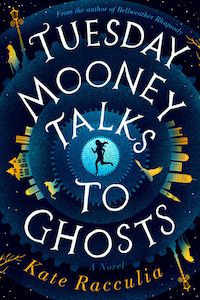
4 Great Novels About Philanthropy
Philanthropy has become more front and center in people’s minds in the past few years. Philanthropists’ megagifts (multi-millionaire dollar gifts) are making headlines, such as Mackenzie Scott’s $1.68 billion in donations to 116 nonprofits in late July, as well as studies about philanthropy taking off at places like the Lilly Family School of Philanthropy at Indiana University or Fidelity Charitable. With this increased interest in philanthropy, there’s increased scrutiny on the field, looking at how megagifts may skew or impact nonprofits’ missions, the ethics of receiving gifts, and much more. These issues are even starting to show up in fiction in a wide variety of contexts.
Since I’m a fundraising professional when I’m not reading and writing for Book Riot, I’ve put together a list of four novels that explore different elements of philanthropy that have been published in the last few years. Interestingly three of the books have fantastical elements.
The City We Became by N.K. Jemisin
This might be one of my favorite books of the first half of 2020 so I can’t stop thinking about it. Jemisin has managed to find a way to touch on every issue that we are dealing with today. To briefly summarize the plot, cities can become alive with individual people basically becoming local gods/protector of the city. But there are forces that want to stop cities from becoming alive. New York is on the verge of life but something goes wrong. Five strangers embodying the five boroughs of NYC have to band together to save the city from dark forces.
A momental scene in the book touches on the challenges that nonprofits have when it comes to taking donations. (I want to credit my fellow panelist, Michelle Muri, who brought up this point at a recent Town Hall meeting of Community Centered Fundraising. Muri is behind the podcast “The Ethical Rainmaker.” CCF is working to make fundraising more equitable).
There’s a point in the book when a small nonprofit has the opportunity to receive a life-changing gift, but at a huge price to their mission and ethics. Nonprofits across the country are having to make a choice to accept a large gift that may be at odds with their mission or result in a pivot that may not be ideal to their mission or risk losing critical funding. We’ve seen the scandals with institutions receiving money from ethically perilous people and organizations, notably like Jeffrey Epstein. The book really puts it in a stark light on the hard choices that nonprofits have to make when faced with this kind of money and the power that wealthy philanthropists can wield over nonprofits.
Oval by Elvia Wilk
What would happen if people could take a pill that would make them more philanthropic? That’s at the core of this book that takes place in a Berlin fraught with a housing crisis and other deprivations. The main character, Anja, lives with her boyfriend, Louis, in an experimental eco village thanks to the generosity of her employer, but the experiment is not going well. Anja finds herself out of her research job and into a consulting job at the same place. She’s also grappling with her boyfriend’s lack of remorse at the sudden death of his beloved mother. Both are trying to figure out how to do good in the world, as they go from bar to bar, drug to drug.
Then Louis reveals that he has been working on a pill, a new designer drug, that makes people more generous by making them feel really good. However, the book makes the critique that feeling good about philanthropy might not be the best strategy, especially for the people who are supposed to benefit from philanthropy. This again hints at the problem of mission creep that we see in The City We Became.
Tuesday Mooney Talks to Ghosts by Kate Racculia
So this might be my other favorite book from the first half of 2020. It’s been described as an adult version of The Westing Game. Basically, it involves a scavenger hunt in Boston with treasure at the end! Those elements would have been enough to endear me but the book’s main character, Tuesday Mooney, is a prospect researcher, which is what I do. Basically she’s a researcher who identifies and evaluates major gift donors for her institutions. It’s an entire field of work, but is not well known outside of fundraising circles. I was really thrilled to see someone represent our profession.
While the book mostly focuses on the scavenger hunt, worth the price of the book itself, it also explores the importance of ethics in the world of prospect research and fundraising in general. Since we have so much information at our disposal—within our databases, the aggregated databases, and news resources— we have to be careful stewards of the data and make sure that is used appropriately and accurately. And it’s also got some warnings about donors who have too much power within nonprofits.
Uptown Thief by Aya de León
With increasing reports on the widening wealth gap as well as the recent publication of Gilded Giving on how even philanthropy has become unequal, Uptown Thief feels like a much needed critique.
Former sex worker Marisol Rivera runs an escort service to fund her women’s health clinic. But funding the health clinic is a constant problem, something that resonates in our day and age with health care and under resourced populations. So the escorts also rob from their wealthy jerkish clientele to help deal with the funding pitfalls. Like a modern day Robin Hood. But things start to heat up for Rivera on several fronts, including romantically, so can she hold it all together?
While it’s a fun romance, it’s also a commentary on the challenges of small essential nonprofits (ahem, healthcare) having difficulty getting the funding they need even though the economy is booming and the richer are getting richer. While nonprofits don’t typically have to resort to heists to pay the bills (hopefully!), it’s definitely a critique on how we prioritize who gets money and who doesn’t.
So that’s four novels that tackle the wild world of philanthropy in different and important ways. I look forward to seeing more books of fiction that tackle the challenges we’re facing in the field of fundraising.
If you want more books on philanthropy, check out my earlier post on 5 non-fiction books about philanthropy or another Rioter’s books to radicalize your beach bag.

















